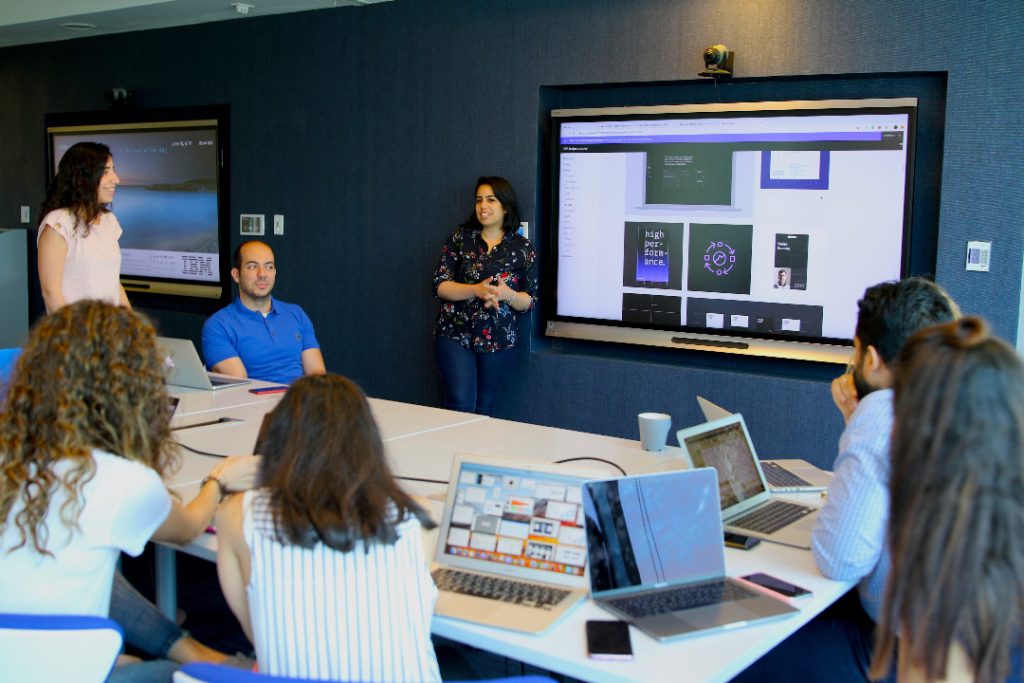Innovation in today’s world is all about digital transformation; from transforming traditional transportation through apps or changing internal structures in major companies across industries, today’s innovation has an 80% chance of being based on new technologies.
And one company continues to be in the center of innovation, international technology giant IBM has been around for decades, literally a century. Building and perfecting items from clocks to laptops and even data centers, IBM has always been a part of technology’s fast-paced history.

We were lucky to talk with IBM SVP, Digital Sales & Chief Marketing Officer, Michelle Peluso as IBM opens a new Innovation and Industry Client Center and a Marketing Services Center in Cairo.
The innovation center aims to address business challenges by connecting clients with technical skills and expertise with a focus on AI, cloud, blockchain, security, and IoT. It will also showcase live demos for IBM solutions including customer proof of concepts for key industries.
- Advertisement -
The IBM Marketing Services Center will act as the marketing engine for IBM across the region, which will plan and execute optimized end-to-end digital marketing campaigns in English and Arabic, with Turkish and French planned by the end of 2019.
It looks like IBM is poised to take over the Egyptian capital with their technological know-how, so we talked to Michelle on how certain technologies are affecting innovation and marketing.
IBM has been at the center of many major tech-turning points in history. How is it keeping up with today’s technological pace?
This month, IBM celebrated 108 years as an organization. For more than a century, IBM has brought together next generation technologies with industry expertise, understanding the underbelly of every industry to help our clients transform time and time again, always with trust, security and responsible stewardship.
IBM has never been defined or branded by what we sell. Technologies, products and organizations come and go. We have made cheese slicers, scales, clocks, typewriters, and laptops. For any great brand, it is important to have clarity about what defines you and what never changes. What doesn’t change is the IBMer.
Of course, throughout our history IBM has been passionate about innovation that matters – for our company and the world — and that our commitment extends far beyond checkbook philanthropy – we are dedicated to implementing technology for good.
We see a huge opportunity in helping businesses reinvent and be more successful through actually applying technology, data and amazingly designed experiences to both the enterprise as well as the consumer base.
As a marketer, which new technologies do you feel will affect or are affecting marketing the most? Why?
I believe marketers are in more of a position now than ever before to be both creatives and data scientists – artists and technologists. Where traditionally marketers thought of technology second, now they are using tech to their competitive marketing advantage. I especially see the potential for technologies like AI and Blockchain.
AI will transform marketing in three ways:
1) What we know about the customer – using tools like Watson Personality Insights, we can learn more about consumers’ intentions and needs than ever before.
2) How we interact with the customer – with one of our tools, Watson Ads, brands can actually have 1:1 engagement with customers in an ad experience. So, say Toyota wants to engage a customer in a conversation about a car. The customer can actually design and have a full conversation about their dream car in this experience, seamlessly.
3) Third, it’s really going to change how we work as marketers to create experiences. Our teams use a tool built in-house called Pearl to do their work. With Pearl’s built-in AI alerts, marketers can be notified when there is something in their campaign that Watson feels can be optimized – it could be a banner image or a call to action or an asset that isn’t performing well. When marketers take an action, the system is learning, based on how the campaign continues to perform.
But I’ve also been really excited about the potential for Blockchain in Marketing. The media supply chain is extremely complicated and messy. It wasn’t that long ago where every $1 we spent, .85 cents made it to the publisher. Now, for every $1 we spend, only about .40 cents makes it in front of your intended audience.
There’s a real lack of transparency, challenge with reconciliation, concerns around brand safety and overall, less of our money is reaching our prospects.
At IBM, we’ve launched a consortium of media vendors, publishers and advertisers who are all committed to piloting blockchain for this specific supply chain – because, after all, every part of the supply chain has to be bought in, in order for this to work. The idea is that we can cut out some tolls along the way and save an average of .20 cents per transaction. Again, this is in the pilot stage, but we’re optimistic about what this will mean to the future of marketing.
Just how agile and accepting do you think brands and agencies should be with these new changes to the marketing game?
I have really been passionate about data and about agile for most of my career. When I came to IBM and we made the decision to move into agile squads, one of the things I knew we would need to is make sure our valued agency partners would be bought in to work this way with us. It’s really important to us that we are all working in the same way, we are all reading data in the same way.
We have done a lot of work to get there and it’s an ongoing journey where we’re learning every day. What becomes most important is that you have to be willing to move quickly, think and be bold, and embrace change. That’s how we, as marketers, can always be at the forefront of how to surprise and delight our customers.
What is your advice for marketers in emerging markets? Many of which are still barely thinking about the use of such technologies, and don’t really know how or when to apply them. Which technologies should these marketers start investing time and energy on?
The marketing landscape has completely changed. It was a profession about art, creative, the big idea and now it’s a profession rooted in science and data. This means the marketing opportunity has also changed.
We as marketers seek deep relationships with people – where they gain something of value from us based on their personal hopes, wants, and needs. Emerging technologies such as artificial intelligence enables this deep customer engagement where marketers can understand so much more about the customer – on an individual level – and create more personalized journeys that give customers great value.

These personalized experiences empower the consumer and help to create meaningful connections with the brand, that may ultimately lead impact purchase consideration and reveal new brand insights.
So, for your own learning, I’d say start with data and learning new analytical skills. Then I’d focus on understanding conversational AI and how that will shape marketing. Finally, I’d start thinking about blockchain and media dollars. But all this points to an important fact – we are marketers, now more than ever, [that] need to be continual learners.
Let’s talk a little bit more about the technologies themselves. Let’s start with two of the biggest buzzwords of the last 2 years, Bitcoin and blockchain. What exactly is Bitcoin and Blockchain and how can it affect marketing or brands, both internationally and here in MENA?
Bitcoin and blockchain are types of crypocurrency that have two distinct characteristics. Bitcoin is a type of unregulated digital currency created to bypass government currency controls and simplify online transactions by getting rid of third-party payment processing intermediaries. Bitcoin transactions are stored and transferred using a distributed ledger on a peer-to-peer network that is open, public and anonymous called a blockchain. Blockchain is the underpinning technology that maintains the Bitcoin transaction ledger.
Beyond currency, leading companies use blockchain as a base capability to build trust, transparency and data synchronization across ecosystems –and to create new business models.
For marketing, there are a number of benefits a blockchain offers including greater digital ad transparency, reduced time for finding information, decreased costs and having an efficient, single and unified view of how media is purchased and delivered.
Blockchain technology can be applied to tackle some of the most pressing problems facing advertisers and publishers today in the digital age. A distributed ledger technology, can change media buying by enabling parties in a network to agree on a transaction without the need for third parties or centralized control globally.
Transparency created by a fully adopted blockchain can address trust, control and arbitrage concerns in the supply chain to restore billions lost to middlemen or eaten up by fraud. It can also promote brand safety for today’s marketer.
What about Data-driven marketing vs privacy? There have been a lot of headlines lately about data and privacy leaks, how does it all affect marketers and what can the average marketer do to protect themselves and their consumers?
A year of high-profile scandals involving the irresponsible handling of consumer data by a few dominant online platforms have people around the world asking important questions: Who is collecting my data? Why? What are they doing with it? Can I take back control?
However, for more than a century, IBM has earned the trust of the world’s most respected businesses through the responsible stewardship of their most valuable data. IBMers work every day to earn and re-earn that trust.
IBM believes our clients’ data is their own. Unlike other companies, we do not require that clients relinquish rights to their data in order to benefit from IBM solutions and services. Our client agreements are transparent, and we do not use client data in ways they have not agreed to.
All of us as marketers need to spend significantly more time on this issue than we have in the past.
It’s incumbent on us to understand how our partners collect and use data, how we as companies collect and use data, what regulations beyond GDPR might happen, and to stake out clear principles in how we operate.
We need to simplify privacy statement so they are more clear and transparent, and we need to be vigilant as the landscape is changing so rapidly. Each of us as marketers must own this for our firms and be responsible stewards of the trust our consumers place with us.
New technologies continue to affect how we marketers do our work, for better or worse, but just how important do you believe these technologies are for digital innovation or innovation in general? How do they help us create better brands, better products and happier consumers?
I do think, to my earlier point, that these new capabilities available to marketers are, in fact, helping us create better brands, better products and happier consumers. We’re hearing this more and more from every consumer that they feel more of an affiliation with brands that share their values.
They don’t want to just like the brand, they want to feel a connection, they want to see themselves and causes they care for represented through the brand, through the products.
One great example from IBM right now is the forecast: change campaign we’re running right now through the Weather Company, which is, of course, an IBM company.
Today, nearly 663 million people in the world live without access to clean water. As our planet warms, we see this increase in severe weather – floods, droughts – all over the world. To help bring awareness to this global issue – a cause that really is authentic to both The Weather Company and the IBM brands – we rebranded to “The Water Company” for World Environment Day and visits to The Weather Channel app and weather.com are contributing towards unlocking clean water for people in need. So far, the feedback has been super positive, and there’s so much more we can do.
In fact, in February of this year, IBM launched Code and Response, which is a $25M, four-year deployment initiative for social good to make sure we are putting open source technologies and the resources to build, fortify, test and implement those solutions at scale, in the communities where they are needed most. I’m super excited to be here as part of the judging panel for Code for Cairo, which is one of the local events we’re hosting as part of this broader effort.
Lastly, what do you think is next for marketers in the evolving marketing landscape? How should CMOs and even entry-level marketers prepare themselves for the future?
What’s really core to being at the forefront of any profession, I believe, is a passion for being a lifelong learner. You have to understand that there is always so much more to learn and that the types of things you will need to learn and the types of skills that you will need to develop are going to rapidly change.
As a CMO or as any leader, you want to have people on your team who have that passion and that drive within them. They know they can always be better tomorrow.
At IBM, we fundamentally believe that we need to prepare the incoming workforce with new skills needed in this era of technology. It’s why we’ve been investing in apprenticeship programs and, of course, P-TECH schools, which is IBM’s six-year high school/University program that brings in valuable industry experience throughout their education. So far, we’re proud to have 200 schools across 13 countries with 125,000 current students.
IBM and Egypt
IBM cements its hold in Egypt and MEA with the new centers.
According to IBM, “Supporting Egypt’s national agenda, the centers aim to help fast track Egypt’s digital transformation for both public and private organizations through advanced technologies including AI, digital, security, blockchain and hybrid cloud. IBM has selected Egypt as the location for its two strategic centers because of the country’s unique advantage as an innovation hub in the region with access to highly skilled talent.”
According to the Commercial International Bank (CIB), one of IBM key banking clients in Egypt: “IBM is a strategic partner of CIB in running and building the Bank’s IT roadmap with their world-class technology solutions and services,” said Khurram Qadir, Chief Information Officer, Commercial International Bank (CIB). “With IBM’s technology solutions, we achieved seamless integration within systems and build robust infrastructure platform. IBM enterprise solutions like enterprise data capture and content management solution, enterprise archiving solution helped us to build efficient technology platforms for the business. IBM Business process management platform helped in improving CIB business processes. We value IBM’s true partnership and will continue to partner with them in our future Technology journey.”
“Today witnesses another step forward in IBM’s commitment to Egypt.” said Wael Abdoush, General Manager, IBM Egypt. “Since its establishment in Egypt in 1954, IBM has been contributing towards the Egyptian economy and working side by side with the Egyptian government on multiple projects of national importance.”








